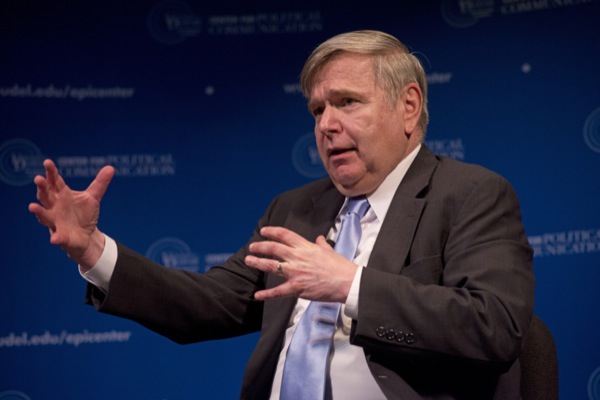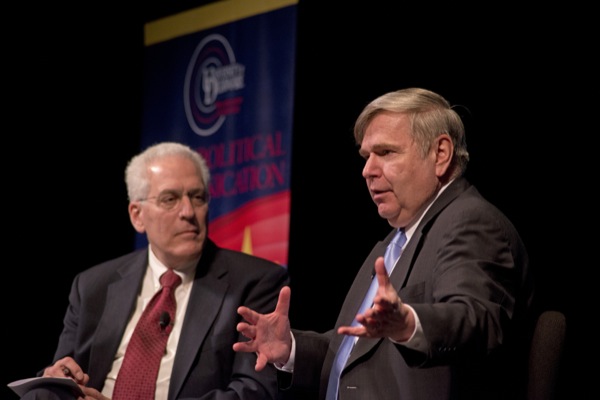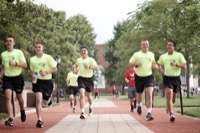Global Agenda
Former CIA spokesman says enhanced interrogation techniques paid dividends
1:42 p.m., Feb. 28, 2013--Controversial enhanced interrogation techniques, or EITs, played an important role in the fight against the al-Qaida terrorist network, former CIA spokesman Bill Harlow told a University of Delaware Global Agenda audience Wednesday night in Mitchell Hall.
Harlow, the opening speaker in the spring series focused on “America’s Role in the World,” said it is an “annoying myth” that no good came of intelligence gathered through EITs.
People Stories
'Resilience Engineering'
Reviresco June run
“Do the math,” he said, noting that there have been no mass casualty attacks on U.S. soil for a decade.
Harlow added that depictions of the techniques in movies such as Zero Dark Thirty go far beyond those actually used by the CIA, which he described as “fairly mild” and designed to scare rather than harm detainees.
The techniques, which he said are “harsh, but not torture,” can include grabbing a detainee by the collar, putting one’s hands on the sides of a detainee’s face and shouting, and carefully prescribed slaps, the latter only if permission is granted in writing.
They also include waterboarding, which Harlow said was used with just three detainees, adding that it is part of U.S. military survival training.
EITs, for which Department of Justice approval was sought and received, were a result of the Sept. 11, 2001, attacks on New York and Washington, D.C., which Harlow said was the “worst day in CIA history.”
The agency, which through the Cold War had been looking for large targets, was suddenly tasked with finding much smaller and widely dispersed targets.
The CIA understood that terrorism – and specifically Osama bin Laden’s al-Qaida -- was a growing threat as early as 1996 but was unable to gather the secrets necessary to know when, where and how the terrorists would strike.
Harlow said that what the CIA had before the attacks was a million piece jigsaw puzzle with no boxtop with a picture to guide them in putting the pieces together – a million-piece puzzle with another million pieces that looked like they could fit but did not. The Sept. 11 attacks, he said, were the boxtop.
In shifting its focus to al-Qaida, the agency found evidence that a second wave of attacks was in the plans, with one terrorist already having pre-taped a celebratory video.
Had there been a second wave, Harlow said the CIA “would have felt that we had blood on our hands,” and the agency began work in earnest to dismantle the terrorist network.
With the use of enhanced interrogation techniques, he said, “results came fairly quickly.” And he reminded the audience that the trail to Abbottabad, Pakistan, where a U.S. Navy SEAL team found and killed bin Laden, began with enhanced interrogations.
Harlow expressed concern that the further the nation moves from 2001, the more second guessing – even among those politicians who had been on board at the beginning -- about the tactics used to fight the terrorists.
He said that creates severe pressure on CIA personnel and that it is difficult to focus on the job at hand when “being chased by investigators.”
Harlow also questioned whether drone attacks, which he called the “world’s worst kept secret,” better serve the nation’s needs than enhanced interrogation. He said that while EITs created discomfort, drones kill – and can kill more people than just the intended target.
New threats
In addition to the potential for major issues with the nations of Iran, Syria and North Korea, Harlow said a major new threat is cyberterrorism.
Cyberterrorism can be accomplished by a very few people but can have an enormous impact, with America’s private sector particularly vulnerable.
Cyberterrorism is complex because the lines between “foreign” and “domestic” activities can become blurred.
Should there be a major cyberterrorism attack, Harlow said the U.S. military would likely be involved because “no one can match the military’s current computing power.”
About Global Agenda
Global Agenda is sponsored by the Center for Political Communication and presented by the Institute for Global Studies, the Department of Communication and the Department of Political Science and International Relations.
The theme of this year’s Global Agenda is “America’s Role in the World.”
The series is moderated by Ralph Begleiter, director of UD’s Center for Political Communication.
The series is free and open to the public.
It will continue March 13 with a presentation on “The U.S. in the Middle East” by Rami Khouri, internationally syndicated political columnist and author, director of the Issam Fares Institute of Public Policy and International Affairs at the American University of Beirut and editor-at-large of Beirut’s Daily Star newspaper.
Article by Neil Thomas
Photos by Duane Perry












